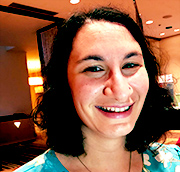by Becca Ehrlich
I grew up in an interfaith household. My Mom is Roman Catholic; my Dad is Jewish. Though neither of my parents were particularly active in their faith traditions, we celebrated both Hanukkah and Christmas, a tradition I continue to do every holiday season.
I was confirmed and welcomed into the church as an adult at my Roman Catholic congregation when I was 17. One day, sitting with my Mom in the pew before Sunday worship (I was the one who brought my Mom to church, not the other way around!), I asked my Mom what a priest did for the rest of the week. She explained about church administration, hospital visits, and other ministry responsibilities. I turned to my Mom and said, “If I were a man, I would be a priest.”
I was accepted into Muhlenberg College and chose to go there. I knew it was a Lutheran (ELCA) school because when we visited, our tour guide told us that all the doors of the buildings on campus were painted red because it was “a Lutheran sign of welcome.” So I attended a Lutheran school, only knowing one tidbit about Lutherans. I eventually became president of the Catholic Campus Ministry (Newman Club) at Muhlenberg, helping lead and plan programs, working closely with the Catholic chaplain (a local Roman Catholic priest), and singing in the choir at Sunday night Mass.
I started to realize that God wanted me to pursue professional ministry, so I chose a ministry avenue that was open to me as a Roman Catholic female—I decided that I wanted to be the head of Youth Ministry for a Diocese (which is a regional area, like a Synod). I was told that having a Master’s degree in Theology was a requirement for a position like that, so I went to LaSalle University in Philadelphia, a Catholic school, to get my M.A. degree.
While in graduate school, I needed to eat and pay for books and rent, so I applied for youth ministry positions around the city. I ended up getting a job doing children and youth ministry at an ELCA congregation. I asked for some literature on Lutherans to know how to teach and lead programs for Lutheran youth.
That’s when my life completely changed.
I read about the Lutheran emphasis of being “saved by grace through faith,” the fact that we don’t earn salvation, and God saves us and loves us unconditionally. I read about how this theological emphasis is in the Bible: “For by grace you have been saved through faith, and this is not your own doing; it is the gift of God— not the result of works, so that no one may boast (Ephesians 2:8-9).
I knew, at that moment, I had to be a Lutheran.
Around this same time, while praying in the congregation’s sanctuary, I had a very emotional experience in which I felt a nudge to go into the pulpit (the place where the Pastor often preaches). While there, I felt an overwhelming sense of belonging—and I started sobbing on the floor of the pulpit because I knew that if I pursued this call to be a pastor, I would be deviating from what I’d been taught my whole life—that being a pastoral leader was only for men.
I started taking new members classes, and that fall, I officially joined the Lutheran congregation during Sunday worship. I call that day my “Lutheran birthday.” It was a particularly big day because when I was received into the congregation, our Synod Bishop also happened to be visiting that day. Our bishop at the time was female– no small detail, considering I was leaving a tradition in which females couldn’t be priests, let alone bishops.
I had a steep learning curve being a new Lutheran because almost everyone around me had been a Lutheran since birth. I didn’t know the typical Sunday School songs, the church lingo, or the “alphabet soup” of seemingly unending acronyms for different ministries and organizational structures in the ELCA. But I diligently learned everything I could—I was determined to be a “good Lutheran.”
Recently, I presented an idea for a new ministry plan with a team that focused on implementing new initiatives in the church.
I met with a team member over Zoom; it became clear minutes into our meeting that he had an official form he was filling out while we talked. As we talked about the potential ministry idea, he became more and more flustered. He eventually looked down at the form, which had a list of specific boxes he had to choose from (and pick one to check off), and he said to me woefully, “There isn’t a box for that.”
“There isn’t a box for that” summarizes my experience as a new Lutheran in the ELCA, even as someone who has been a Lutheran for 18 years now. It has frequently felt like my chosen denomination hasn’t chosen me back. I have met some amazing colleagues and friends in the ELCA who are doing great work. But by and large, as someone who chose to be Lutheran rather than being born into the tradition, I’ve never felt like I fit in enough. I have never checked off the “correct” boxes for how Lutherans are supposed to be.
I hope and pray that, as the ELCA considers what it means to be Lutheran, we will let go of the boxes that have restricted us for so long. The Holy Spirit is doing new and incredible things, and we cannot get on board with what the Spirit is doing if we cling to our self-made boxes, thinking that God only works in those specific ways.
Being a good Lutheran isn’t about contorting ourselves into required boxes; it’s about reminding ourselves and one another that God saves and loves us unconditionally—and we are invited and called by God to share God’s love with everyone.
Discussion questions:
1. For you personally, what does it mean to be a Lutheran?
2. What are some required “boxes” in our congregations, ministry sites, and in the ELCA that limit us and keep us from doing God’s innovative work?
3. How can we actively work to let go of these “boxes” and be open to what God is doing?
Closing prayer:
Loving God, we thank you for loving us and giving us the gift of salvation with no strings attached. Help us to share your love with others and to let go of those restrictive boxes that keep us from doing your creative work in our world. In Jesus’ name, we pray, Amen.
 The Rev. Dr. Becca Ehrlich is a writer, author, and spiritual director. She serves as Executive Director and Founder of New Breath Spirituality Center, and Adjunct Professor of Christian Spirituality at United Lutheran Seminary. She blogs about minimalism from a Christian perspective at www.christianminimalism.com and her book Christian Minimalism: Simple Steps for Abundant Living was released in 2021.
The Rev. Dr. Becca Ehrlich is a writer, author, and spiritual director. She serves as Executive Director and Founder of New Breath Spirituality Center, and Adjunct Professor of Christian Spirituality at United Lutheran Seminary. She blogs about minimalism from a Christian perspective at www.christianminimalism.com and her book Christian Minimalism: Simple Steps for Abundant Living was released in 2021.


Knowing myself to be a Lutheran was realizing I was loved unconditionally, maybe not by my parents and others, but by God. I am much older than you, and when I walked diagonally across the street from the Catholic church and school I grew up in to become a Lutheran, in 1973 it felt natural, and when I crossed the street to go to LSTC that also felt natural. Not perfect, but natural and organic. Big but — but if I knew the ELCA was the whitest denomination in America I don’t think I would have crossed the street at all.
Thank you, Becca for you ever inspiring insights.
God’s blessings,
Peg Marose, ULS ’21
Hi Becca! William here. I really enjoyed your article. I had no idea that you, like me are a convert to Lutheranism. I came from the Roman church, through Protestant Evangelicalism, to the ECUSA, finally landing in Wittenberg around 1997. It’s always troubled me that the communion which is closest theologically to Rome and has consistently sought reconciliation, is the one from which I always hear the phrase, “that’s too Catholic!”
Thank you for sharing this!
Becca, I also came from an RC background and became Lutheran. Went through Candidacy and approved, yet I moved and had to start over. Yet, in my new location, I couldn’t check all the boxes. It seems each time I have an idea for moving into the 21st Century, I am also told there is NOT a box for that. I believe the whole Christian Church is in the process of a major shift, (similar to putting a note on a church door). If not for the Printing Press “Lutheran” probably would not even be a denomination. Today we have new technology tools that can propel beliefs to many people, yet the Christian Church on a whole is resistant to embrace and recognize that many worship in different ways and not only for 1 hour on Sunday, yet the options and negative language for people who participate on line is at best negative reaction from those who state “You need to worship in person in a building at a prescribed time” to be GOOD. I’m now part of a small group and we are stretching the boudaries of the “boxes” none of what we do would fall in a “box”. It is time to breakdown the box and look outside to see a new ministry field unfold.